北师大版(2019)必修 第一册Unit 3 Celebrations Lesson 1 Spring Festival课件(共37张PPT)
文档属性
| 名称 | 北师大版(2019)必修 第一册Unit 3 Celebrations Lesson 1 Spring Festival课件(共37张PPT) |
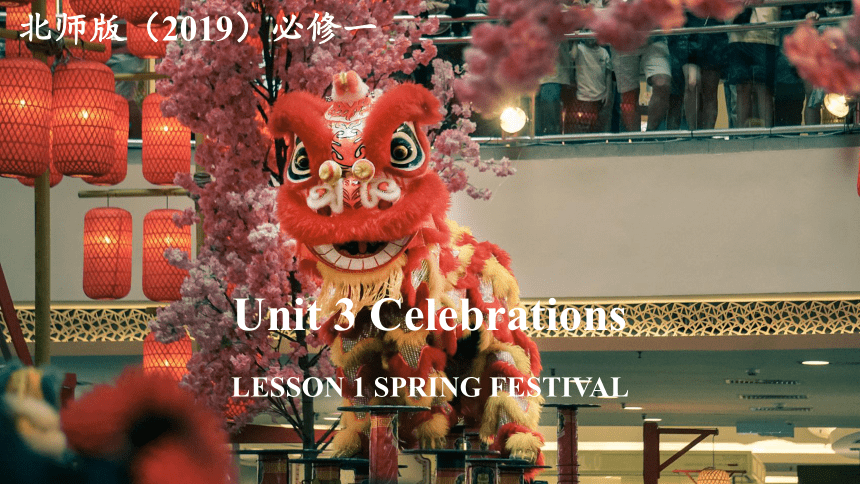
|
|
| 格式 | pptx | ||
| 文件大小 | 58.9MB | ||
| 资源类型 | 教案 | ||
| 版本资源 | 北师大版(2019) | ||
| 科目 | 英语 | ||
| 更新时间 | 2023-10-12 00:00:00 | ||
图片预览

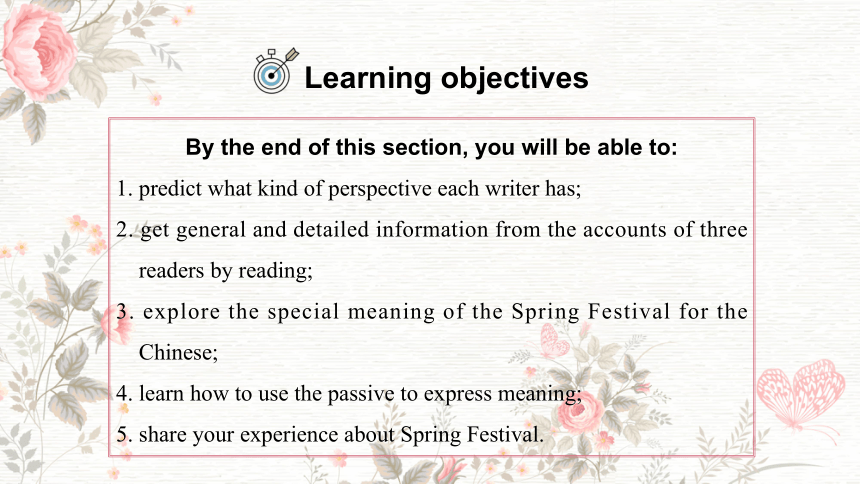
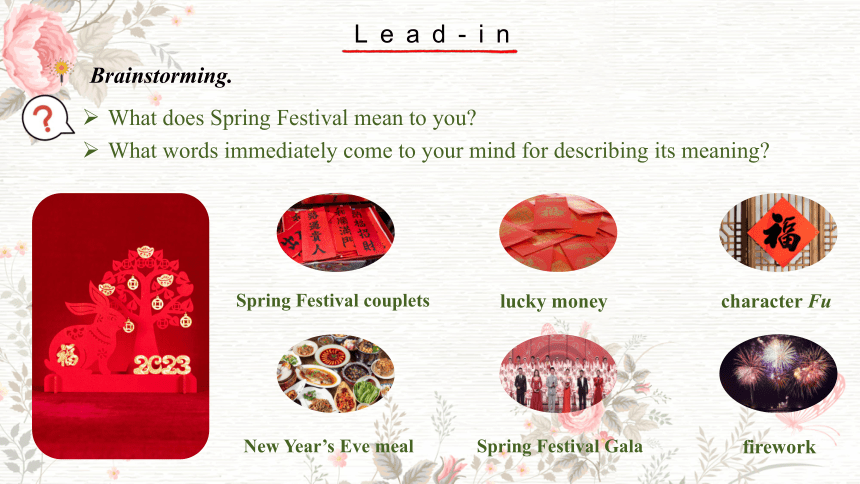
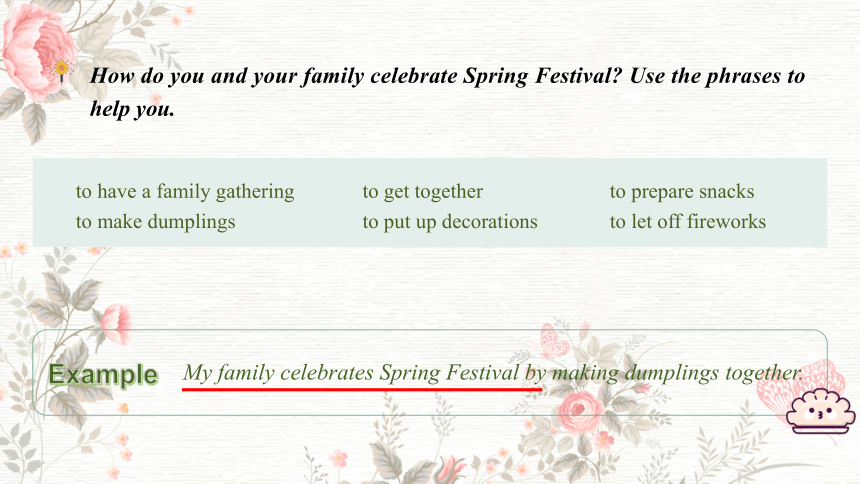
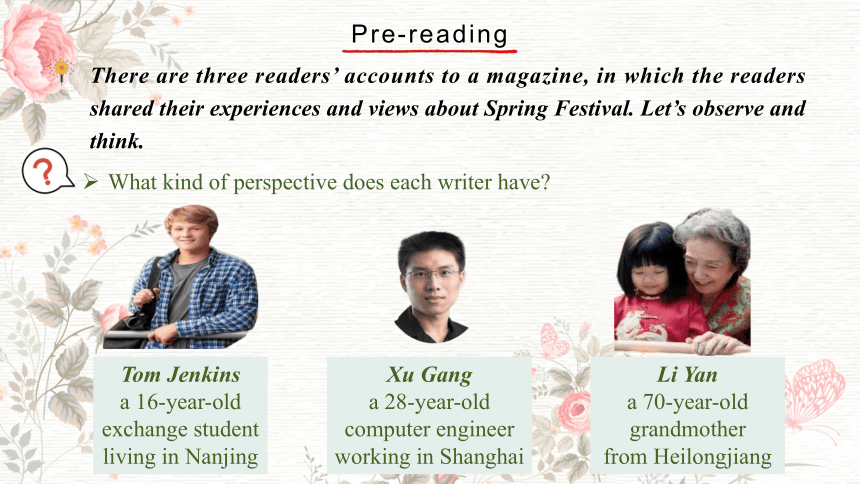
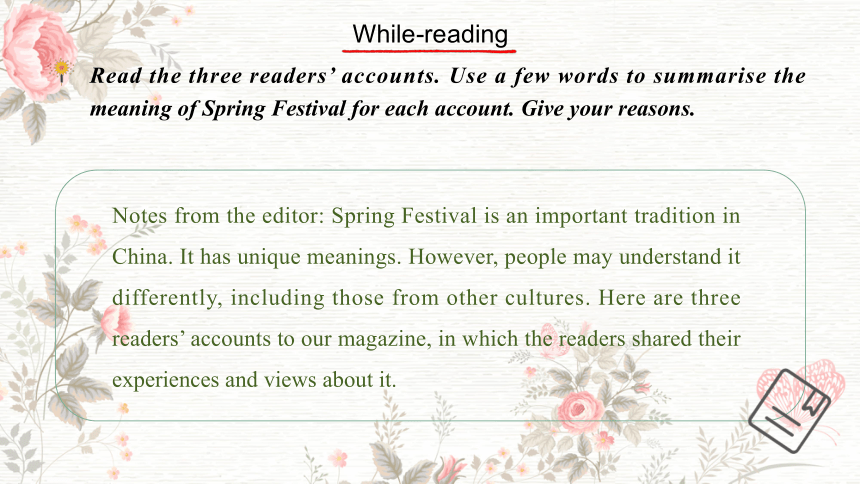
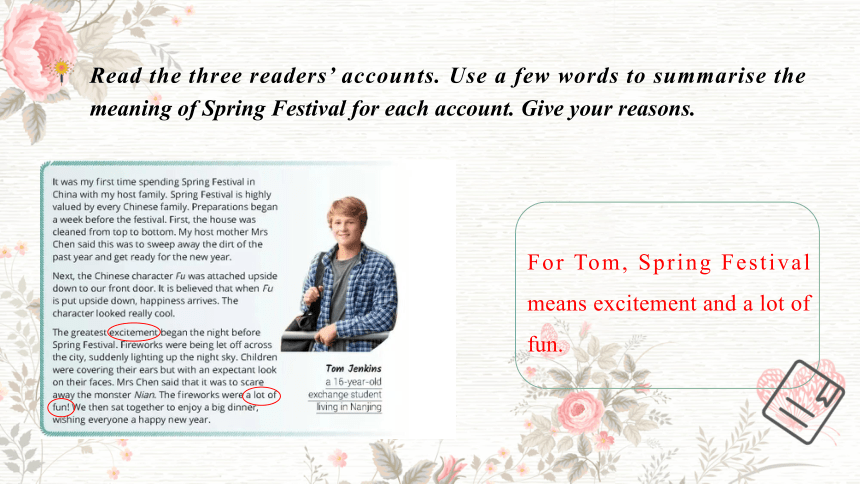
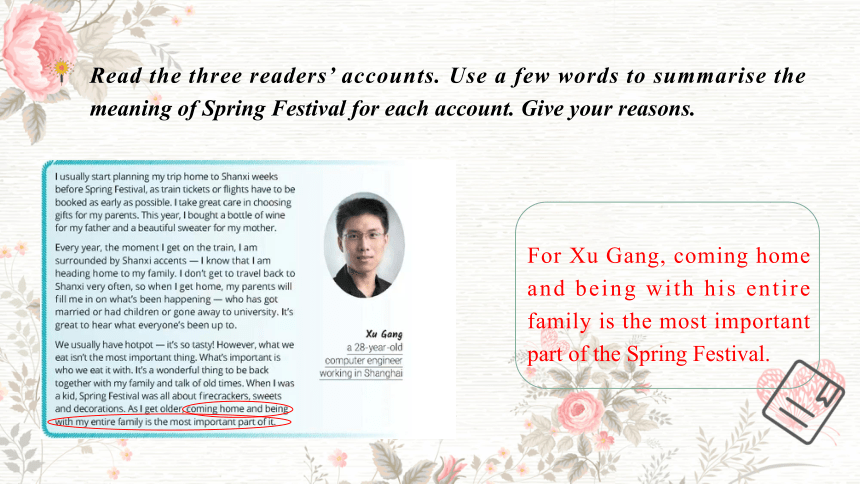
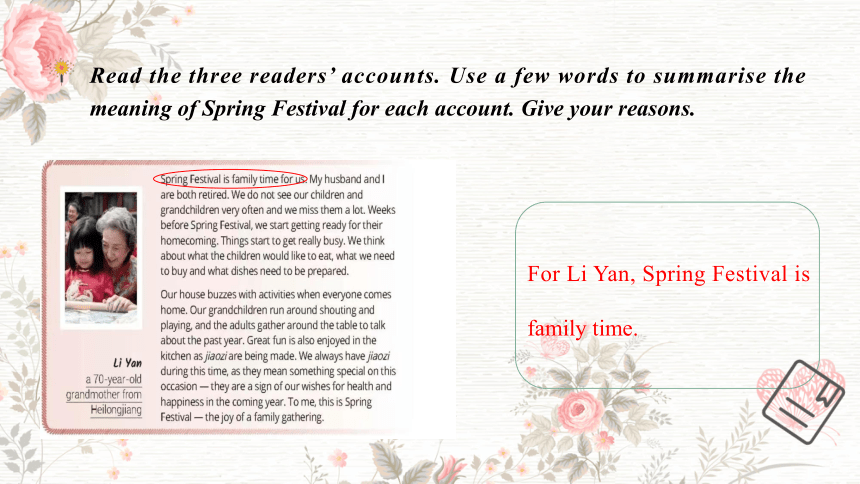
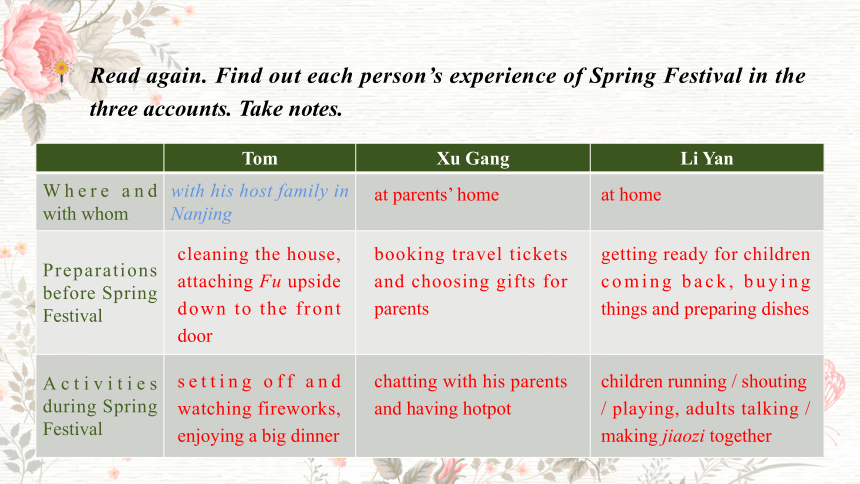
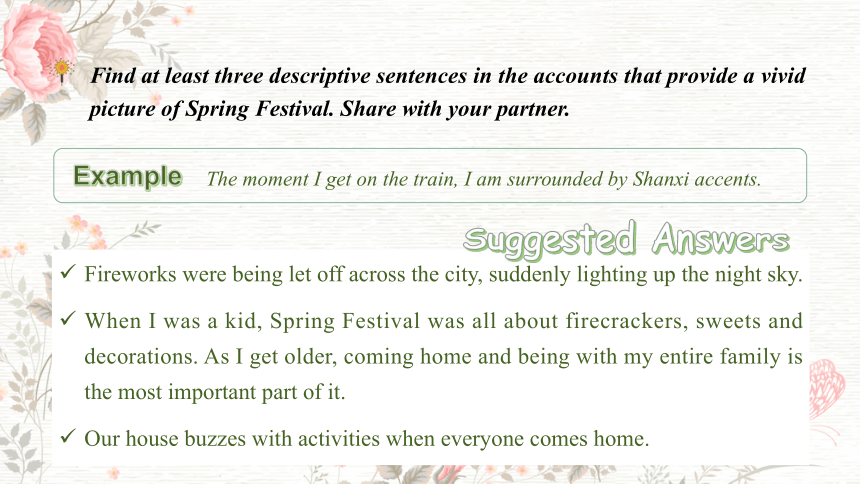
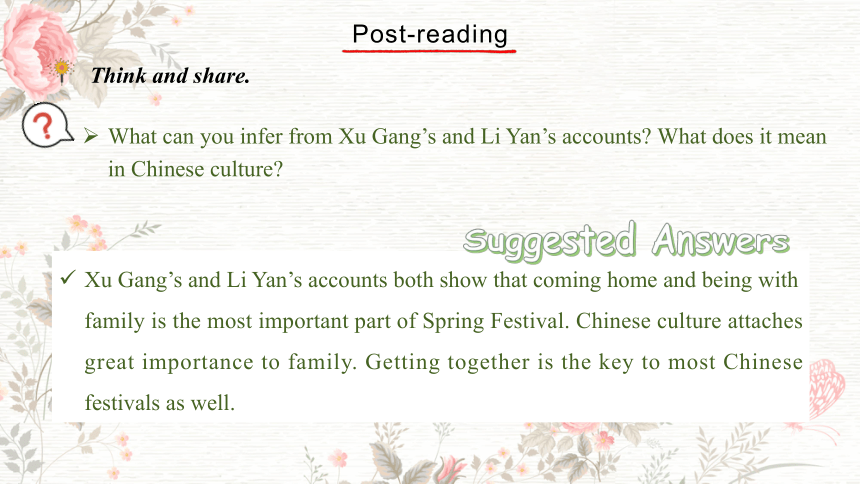
文档简介
(共37张PPT)
北师版(2019)必修一
Unit 3 Celebrations
LESSON 1 SPRING FESTIVAL
Learning objectives
By the end of this section, you will be able to:
1. predict what kind of perspective each writer has;
2. get general and detailed information from the accounts of three
readers by reading;
3. explore the special meaning of the Spring Festival for the
Chinese;
4. learn how to use the passive to express meaning;
5. share your experience about Spring Festival.
Brainstorming.
Lead-in
What does Spring Festival mean to you
What words immediately come to your mind for describing its meaning
character Fu
Spring Festival couplets
lucky money
New Year’s Eve meal
Spring Festival Gala
firework
How do you and your family celebrate Spring Festival Use the phrases to help you.
to have a family gathering to get together to prepare snacks
to make dumplings to put up decorations to let off fireworks
My family celebrates Spring Festival by making dumplings together.
Example
There are three readers’ accounts to a magazine, in which the readers shared their experiences and views about Spring Festival. Let’s observe and think.
What kind of perspective does each writer have
Tom Jenkins
a 16-year-old
exchange student
living in Nanjing
Xu Gang
a 28-year-old
computer engineer
working in Shanghai
Li Yan
a 70-year-old
grandmother
from Heilongjiang
Pre-reading
Read the three readers’ accounts. Use a few words to summarise the meaning of Spring Festival for each account. Give your reasons.
While-reading
Notes from the editor: Spring Festival is an important tradition in China. It has unique meanings. However, people may understand it differently, including those from other cultures. Here are three readers’ accounts to our magazine, in which the readers shared their experiences and views about it.
Read the three readers’ accounts. Use a few words to summarise the meaning of Spring Festival for each account. Give your reasons.
For Tom, Spring Festival means excitement and a lot of fun.
Read the three readers’ accounts. Use a few words to summarise the meaning of Spring Festival for each account. Give your reasons.
For Xu Gang, coming home and being with his entire family is the most important part of the Spring Festival.
Read the three readers’ accounts. Use a few words to summarise the meaning of Spring Festival for each account. Give your reasons.
For Li Yan, Spring Festival is family time.
Read again. Find out each person’s experience of Spring Festival in the three accounts. Take notes.
Tom Xu Gang Li Yan
Where and with whom with his host family in Nanjing
Preparations before Spring Festival
Activities during Spring Festival
cleaning the house, attaching Fu upside down to the front door
setting off and watching fireworks, enjoying a big dinner
at parents’ home
booking travel tickets and choosing gifts for parents
chatting with his parents and having hotpot
at home
getting ready for children coming back, buying things and preparing dishes
children running / shouting / playing, adults talking / making jiaozi together
Find at least three descriptive sentences in the accounts that provide a vivid picture of Spring Festival. Share with your partner.
Fireworks were being let off across the city, suddenly lighting up the night sky.
When I was a kid, Spring Festival was all about firecrackers, sweets and decorations. As I get older, coming home and being with my entire family is the most important part of it.
Our house buzzes with activities when everyone comes home.
Suggested Answers
Example
The moment I get on the train, I am surrounded by Shanxi accents.
Think and share.
Post-reading
What can you infer from Xu Gang’s and Li Yan’s accounts What does it mean in Chinese culture
Xu Gang’s and Li Yan’s accounts both show that coming home and being with family is the most important part of Spring Festival. Chinese culture attaches great importance to family. Getting together is the key to most Chinese festivals as well.
Suggested Answers
Complete the information with the words or phrases you have learnt.
Tom Jenkins spent his first Spring Festival with his host family. A week before the festival, the host mother Mrs Chen began preparations. She 1.__________ the dirt of the house from top to bottom to make it ready for the new year. She also 2.________the Chinese 3.________ Fu 4.___________on the front door to welcome happiness. Tom also learnt that playing fireworks was to scare away the monster Nian.
Xu Gang usually books the ticket of trains or 5.______ for his trip home weeks before Spring Festival. When he gets on the train, he is 6._________ by Shanxi 7._______. When he gets home, his parents always 8.___________ what happened to the people he knows. Being with his 9.______ family is the most important part of Spring Festival for him.
Li Yan and her husband are 10._______. They start preparing for their family’s return weeks before Spring Festival. When everyone gets home, their house 11._________ with activities. One of their favourite family traditions is to make jiaozi.
Family being together is one of the 12._______ of Spring Festival throughout history.
swept away
attached
character
upside down
flights
surrounded
accents
fill him in on
entire
retired
buzzes
spirit
Review the passive voice.
The boy knocked over the cup and spilled his juice on the rug.
The cup was knocked over and the juice was spilled on the rug by the boy.
subject
object
object
action
action
形式: 助动词be + 过去分词
Highlight the structure of passive voice in these sentences. Underline more examples in the texts.
1. The house was cleaned from top to bottom.
2. It is believed that when Fu is put upside down, happiness arrives.
3. Train tickets or flights have to be booked as early as possible.
4. The spirit of the festival — the spirit of family — has largely been kept.
Spring Festival is highly valued by every Chinese family.
Fireworks were being let off across the city.
I am surrounded by Shanxi accents ...
We think about what dishes need to be prepared.
Great fun is also enjoyed in the kitchen as jiaozi are being made.
Most of the important Spring Festival traditions are still being practised by people across the country.
The Passive
1. 构成:被动语态由“助动词be+及物动词的过去分词”构成。助动词有人称、数和时
态的变化,其变化规则与be作为连系动词时的变化规则一样。
Tense Passive Form
Present simple am / is / are + past participle
Present continuous am / is / are being + past participle
Present perfect have / has been + past participle
Past simple was / were + past participle
Past continuous was / were being + past participle
The Passive
2. 用法:在下列情况下使用被动语态:
(1)不知道也不需要知道谁做的这件事:
It is believed that when Fu is put upside down ...
(2)“动作执行者”显而易见:
The house was cleaned from top to bottom.
(3)动作本身比“动作执行者”更重要,或不想说出谁做的这件事:
The spirit of the festival — the spirit of family — has largely been kept.
(4)在书面语中,特别是在科技报告和新闻报道中,被动语态比主动语态更正式:
Every country was allowed to design their own Euro coins which could be used in any of the participating countries.
The International Space Station has been built in the Earth’s orbit.
The Passive
3. 注意的问题:
(1)不及物动词(短语)不能用于被动语态,这类动词(短语)常见的有happen, last, rise,
occur, break out, take place, come true等。感官动词或表示情况变化的动词也不能用于
被动语态,这类动词常见的有look, seem, appear, feel, taste, smell, sound, remain, stay,
continue, become, grow, get, come, go等。
The war broke out in 1941. 战争于1941年爆发。
(2)在主动语态中,动词see, hear, make, watch, notice等后面作宾语补足语的不定式不
带to,但变为被动语态时,to必须补上。
They made him go there alone. → He was made to go there alone.
(3)带介词或副词的动词短语(如look after, put on, pay attention to等)变为被动语态时,
它们原来所带的介词或副词须保留。
She often looks after the old. → The old are often looked after by her.
The Passive
(4)接双宾语的动词变为被动语态
主动语态:动词+间接宾语(通常指人)+直接宾语(通常指事物)
被动语态:间接宾语变为被动句主语,直接宾语保留;直接宾语变为被动句主语,间接宾
语前面加介词to或for
He gave her some beautiful flowers.
→ She was given some beautiful flowers. (间接宾语变主语)
→ Some beautiful flowers were given to her. (直接宾语变主语)
(5)某些动词通常不使用被动语态,在形式上是主动语态,但含有被动的意思。适用于这
种情况的动词主要有sell,wash,write,drive,eat,shut等。这时主语一般是指物的
名词,这些动词往往指事物的特征,且常用well,badly,easily等副词来修饰。
Books of this kind sell well. 这种书很畅销。
This sweater washes well. 这件毛衣很耐洗。
Choose a proper option for each situation. Explain why.
1. My friend George draws landscape pictures. _________
a. He sells them for money. b. They are sold by him for money.
2. There’s somebody behind us. _________
a. I think we’re being fallowed. b. I think someone is following us.
3. This orange juice tastes awful. _________
a. I think someone has left it outside the fridge for a long time.
b. I think it’s been left outside the fridge for a long time.
a
a
b
What George does is more important than the pictures in the sentences, so “he” is put in the starting point of the second sentence.
“We” in the starting point of the sentence has better effect of showing the dangerous situation. It matters less to know who is following us.
“It” in the starting point of the clause shows that what happened to the juice is more closely related to the taste of the juice. It is less important to know who did it because such information would not change the fact about taste.
Choose a proper option for each situation. Explain why.
4. Tommy takes good care of his car. _________
a. He washes the car every week. b. The car is washed by him every week.
5. The old lady rented an old house. _________
a. Somebody built it in 1900. b. It was built in 1900.
a
b
“He” in the starting point of the sentence better supports the idea stated in the first sentence. What “he” does, not what the car is like shows his care for the car.
“It” in the starting point of the sentence draws more attention to the house, not who built it, and better supports the quality of the house, “old”.
Read the news report. Rewrite the underlined sections in passive voice.
(1) The Lantern Show in Datong, a historic city in northern China, is attracting tens of thousands of visitors during the Spring Festival holiday.
The Lantern Show exhibits over 60 series of lanterns, among which 12 are ice lanterns.
(2) People mix traditional lanterns with ice lanterns to create a special and happy atmosphere. The show usually starts from the fifth day of Spring Festival. Besides the Lantern Show, people can also enjoy many other activities, including traditional operas and lantern riddle guessing games.
(3) Last year, the government rebuilt the ancient walls in this city and (4) this year, the government organised the Lantern Show under the ancient walls for the first time. The newly built ancient walls have now become a calling card for the city.
Officials say that over 80,000 people visited the show on the first day. (5) They expect more people to visit in the coming days. The Lantern Show ends on 16 February.
Read the news report. Rewrite the underlined sections in passive voice.
(1) Tens of thousands of visitors are being attracted by the Lantern Show in Datong, a historic city in northern China, during the Spring Festival holiday.
The Lantern Show exhibits over 60 series of lanterns, among which 12 are ice lanterns.
(2) Traditional lanterns and ice lanterns are mixed to create a special and happy atmosphere. The show usually starts from the fifth day of Spring Festival. Besides the Lantern Show, people can also enjoy many other activities, including traditional operas and lantern riddle guessing games.
(3) The ancient walls in this city were rebuilt by the government last year and (4) the Lantern Show was organised by the government under the ancient walls for the first time this year. The newly built ancient walls have now become a calling card for the city.
Officials say that over 80,000 people visited the show on the first day. (5) More people are expected to visit in the coming days. The Lantern Show ends on 16 February.
Discuss the following questions in your group.
Where and with whom did you spend the last Spring Festival
What preparations did you make
What activities did you do
How do you feel about it
Compare among group members the different experiences and feelings about the last Spring Festival. Then report to the class.
Words and Expressions
to put up decorations (P52)
张贴装饰物
put up 张贴
例句
Posters were put up around our school, calling on us to spare no effort to protect the earth.
校园中到处张贴着海报,号召我们不遗余力地保护地球。
拓展
put up 搭建,建造;举起;提高,增加;留……住在家中;投宿
He decided that he would drive all the way home instead of putting up at a hotel for the night.
他决定一路开车回家,而不是在旅馆过夜。
1
to put up decorations (P52)
张贴装饰物
put up 张贴
拓展
put off 延迟,推迟 put aside 忽视;储存
put out 扑灭;生产;出版 put away 将……收起;积蓄
put up with 容忍,忍受 put down 放下;镇压;记下
put on 穿上;上演;假装;增加体重;播放
put forward 提出;将……提前;拨快;推荐
They need to be putting out cars that get better gas mileage.
他们需要生产出油耗更低的汽车。
Remember to put your clocks forward tonight.
记住今晚把时钟指针往前拨。
1
Read the three readers’ accounts. (P52)
读这三位读者的叙述。
account / ka nt/ n. 描述,报道
搭配
give an account of ... 描述…… open/close an account 开户/销户
have an account at/with a bank 在银行有账户
on account of 因为,由于
on no account 决不,绝对不(位于句首时,句子用部分倒装)
take sth. into account ( = take account of sth. = take sth. into consideration)
考虑到某事,顾及某事
例句
Linda gave us a vivid account of her trip to Mount Tai after her return.
琳达回来后向我们生动地描述了她的泰山之行。
2
Next, the Chinese character Fu was attached upside down to our front door. (P52)
接下来,汉字”福”倒贴在我们的前门上。
character /'k r kt / n. 字,字体;人物,角色
搭配
have a strong/weak character 个性强
in/out of character 符合/不符合……的个性
in character (with sth.) (与……)风格相同
例句
Truly elegant chopsticks might be made of gold and silver with Chinese characters.
真正精美的筷子可能是金银材质的,上面刻有汉字。
Her husband is a man of good character, well-liked and respected by his colleagues.
她的丈夫是一个性格很好的人,很受同事的喜爱和尊敬。
3
Next, the Chinese character Fu was attached upside down to our front door. (P52)
接下来,汉字”福”倒贴在我们的前门上。
attach / 't t / vt. 贴;固定;附上
搭配
attach ... to 把……系于……;把……附/贴在……上(to为介词)
attach (great/little) importance/value/weight/significance to ...
认为……(很有/几乎没有)重要性/价值/分量/意义(to为介词)
例句
While sleeping, astronauts must attach themselves to something to prevent floating around.
宇航员睡觉时必须把自己绑在什么东西上,以防四处飘浮。
拓展
attached adj. 爱慕,依恋;附属于 attachment n. 附属物;爱慕
4
Every year, the moment I get on the train, I am surrounded by Shanxi accents — I
know that I am heading home to my family. (P53)
每年,一坐上火车,我就会被山西方言包围,我意识到我踏上了回家的路。
surround /s 'ra nd/ vt. 环绕,围绕
搭配
surround ... with ... 用………包围……. be surrounded by/with ... 被……包围
例句
When he saw the mists rising from the river and the soft clouds surrounding the mountain tops, he was reduced to tears.
当他看到河面上升起的薄雾和山顶上环绕的柔和的云雾时,他流下了眼泪。
拓展
surrounding adj. 周围的,附近的
surroundings n. 附环境
5
Grammar
It is believed that when Fu is put upside down, happiness arrives. (P52)
据说“福”字被倒贴时,幸福就会到来。
句式剖析
It (形式主语) is believed that when Fu is put upside down (时间状语从句), happiness arrives (that引导的从句是真正的主语).
考点提炼 “It + be + 过去分词 + that ...”句型
It is generally believed that a good education is beneficial to young people.
人们普遍认为良好的教育对年轻人是有益的。
It is said that yoga is of great benefit to people’s health.
= Yoga is said to be of great benefit to people’s health.
据说瑜伽对人们的健康有益。
It is reported that the mayor will visit our school next week.
据报道,市长下周要来参观我们学校。
1
Every year, the moment I get on the train, I am surrounded by Shanxi accents — I
know that I am heading home to my family. (P53)
每年,一坐上火车,我就会被山西方言包围,我意识到我踏上了回家的路。
句式剖析
Every year, the moment I get on the train (the moment引导的时间状语从句), I am surrounded by Shanxi accents — I know that I am heading home to my family (that引导的宾语从句).
考点提炼 the moment/minute/second/instant +句子
名词短语 the moment/minute/second/instant可用作连词,引导时间状语从句,相当于as soon as,意为“一……就……”。
I hadn’t seen him for a long time, but I recognized him the minute I saw him.
我好久没见过他了,但是我一见到他就认出他来了。
2
Every year, the moment I get on the train, I am surrounded by Shanxi accents — I
know that I am heading home to my family. (P53)
每年,一坐上火车,我就会被山西方言包围,我意识到我踏上了回家的路。
归纳拓展 表示“一……就……”的结构还有:
as soon as+句子 immediately/directly/instantly+句子
no sooner ... than ... (主句用过去完成时,从句用一般过去时;no sooner位于句首时,其所在的主句要用部分倒装)
hardly/scarcely .... when ...(主句用过去完成时,从句用一般过去时)
on/upon + V-ing/n.
On arrival/arriving in Beijing, he called his mother.
他一到北京,就给他妈妈打了电话。
No sooner had he arrived than he was asked to leave again.
他刚到达就又让他离开了。
2
Do Activity 4 on page 87.
Write a paragraph describing a memorable moment when you spent the Spring Festival with your family.
Homework
北师版(2019)必修一
Unit 3 Celebrations
LESSON 1 SPRING FESTIVAL
Learning objectives
By the end of this section, you will be able to:
1. predict what kind of perspective each writer has;
2. get general and detailed information from the accounts of three
readers by reading;
3. explore the special meaning of the Spring Festival for the
Chinese;
4. learn how to use the passive to express meaning;
5. share your experience about Spring Festival.
Brainstorming.
Lead-in
What does Spring Festival mean to you
What words immediately come to your mind for describing its meaning
character Fu
Spring Festival couplets
lucky money
New Year’s Eve meal
Spring Festival Gala
firework
How do you and your family celebrate Spring Festival Use the phrases to help you.
to have a family gathering to get together to prepare snacks
to make dumplings to put up decorations to let off fireworks
My family celebrates Spring Festival by making dumplings together.
Example
There are three readers’ accounts to a magazine, in which the readers shared their experiences and views about Spring Festival. Let’s observe and think.
What kind of perspective does each writer have
Tom Jenkins
a 16-year-old
exchange student
living in Nanjing
Xu Gang
a 28-year-old
computer engineer
working in Shanghai
Li Yan
a 70-year-old
grandmother
from Heilongjiang
Pre-reading
Read the three readers’ accounts. Use a few words to summarise the meaning of Spring Festival for each account. Give your reasons.
While-reading
Notes from the editor: Spring Festival is an important tradition in China. It has unique meanings. However, people may understand it differently, including those from other cultures. Here are three readers’ accounts to our magazine, in which the readers shared their experiences and views about it.
Read the three readers’ accounts. Use a few words to summarise the meaning of Spring Festival for each account. Give your reasons.
For Tom, Spring Festival means excitement and a lot of fun.
Read the three readers’ accounts. Use a few words to summarise the meaning of Spring Festival for each account. Give your reasons.
For Xu Gang, coming home and being with his entire family is the most important part of the Spring Festival.
Read the three readers’ accounts. Use a few words to summarise the meaning of Spring Festival for each account. Give your reasons.
For Li Yan, Spring Festival is family time.
Read again. Find out each person’s experience of Spring Festival in the three accounts. Take notes.
Tom Xu Gang Li Yan
Where and with whom with his host family in Nanjing
Preparations before Spring Festival
Activities during Spring Festival
cleaning the house, attaching Fu upside down to the front door
setting off and watching fireworks, enjoying a big dinner
at parents’ home
booking travel tickets and choosing gifts for parents
chatting with his parents and having hotpot
at home
getting ready for children coming back, buying things and preparing dishes
children running / shouting / playing, adults talking / making jiaozi together
Find at least three descriptive sentences in the accounts that provide a vivid picture of Spring Festival. Share with your partner.
Fireworks were being let off across the city, suddenly lighting up the night sky.
When I was a kid, Spring Festival was all about firecrackers, sweets and decorations. As I get older, coming home and being with my entire family is the most important part of it.
Our house buzzes with activities when everyone comes home.
Suggested Answers
Example
The moment I get on the train, I am surrounded by Shanxi accents.
Think and share.
Post-reading
What can you infer from Xu Gang’s and Li Yan’s accounts What does it mean in Chinese culture
Xu Gang’s and Li Yan’s accounts both show that coming home and being with family is the most important part of Spring Festival. Chinese culture attaches great importance to family. Getting together is the key to most Chinese festivals as well.
Suggested Answers
Complete the information with the words or phrases you have learnt.
Tom Jenkins spent his first Spring Festival with his host family. A week before the festival, the host mother Mrs Chen began preparations. She 1.__________ the dirt of the house from top to bottom to make it ready for the new year. She also 2.________the Chinese 3.________ Fu 4.___________on the front door to welcome happiness. Tom also learnt that playing fireworks was to scare away the monster Nian.
Xu Gang usually books the ticket of trains or 5.______ for his trip home weeks before Spring Festival. When he gets on the train, he is 6._________ by Shanxi 7._______. When he gets home, his parents always 8.___________ what happened to the people he knows. Being with his 9.______ family is the most important part of Spring Festival for him.
Li Yan and her husband are 10._______. They start preparing for their family’s return weeks before Spring Festival. When everyone gets home, their house 11._________ with activities. One of their favourite family traditions is to make jiaozi.
Family being together is one of the 12._______ of Spring Festival throughout history.
swept away
attached
character
upside down
flights
surrounded
accents
fill him in on
entire
retired
buzzes
spirit
Review the passive voice.
The boy knocked over the cup and spilled his juice on the rug.
The cup was knocked over and the juice was spilled on the rug by the boy.
subject
object
object
action
action
形式: 助动词be + 过去分词
Highlight the structure of passive voice in these sentences. Underline more examples in the texts.
1. The house was cleaned from top to bottom.
2. It is believed that when Fu is put upside down, happiness arrives.
3. Train tickets or flights have to be booked as early as possible.
4. The spirit of the festival — the spirit of family — has largely been kept.
Spring Festival is highly valued by every Chinese family.
Fireworks were being let off across the city.
I am surrounded by Shanxi accents ...
We think about what dishes need to be prepared.
Great fun is also enjoyed in the kitchen as jiaozi are being made.
Most of the important Spring Festival traditions are still being practised by people across the country.
The Passive
1. 构成:被动语态由“助动词be+及物动词的过去分词”构成。助动词有人称、数和时
态的变化,其变化规则与be作为连系动词时的变化规则一样。
Tense Passive Form
Present simple am / is / are + past participle
Present continuous am / is / are being + past participle
Present perfect have / has been + past participle
Past simple was / were + past participle
Past continuous was / were being + past participle
The Passive
2. 用法:在下列情况下使用被动语态:
(1)不知道也不需要知道谁做的这件事:
It is believed that when Fu is put upside down ...
(2)“动作执行者”显而易见:
The house was cleaned from top to bottom.
(3)动作本身比“动作执行者”更重要,或不想说出谁做的这件事:
The spirit of the festival — the spirit of family — has largely been kept.
(4)在书面语中,特别是在科技报告和新闻报道中,被动语态比主动语态更正式:
Every country was allowed to design their own Euro coins which could be used in any of the participating countries.
The International Space Station has been built in the Earth’s orbit.
The Passive
3. 注意的问题:
(1)不及物动词(短语)不能用于被动语态,这类动词(短语)常见的有happen, last, rise,
occur, break out, take place, come true等。感官动词或表示情况变化的动词也不能用于
被动语态,这类动词常见的有look, seem, appear, feel, taste, smell, sound, remain, stay,
continue, become, grow, get, come, go等。
The war broke out in 1941. 战争于1941年爆发。
(2)在主动语态中,动词see, hear, make, watch, notice等后面作宾语补足语的不定式不
带to,但变为被动语态时,to必须补上。
They made him go there alone. → He was made to go there alone.
(3)带介词或副词的动词短语(如look after, put on, pay attention to等)变为被动语态时,
它们原来所带的介词或副词须保留。
She often looks after the old. → The old are often looked after by her.
The Passive
(4)接双宾语的动词变为被动语态
主动语态:动词+间接宾语(通常指人)+直接宾语(通常指事物)
被动语态:间接宾语变为被动句主语,直接宾语保留;直接宾语变为被动句主语,间接宾
语前面加介词to或for
He gave her some beautiful flowers.
→ She was given some beautiful flowers. (间接宾语变主语)
→ Some beautiful flowers were given to her. (直接宾语变主语)
(5)某些动词通常不使用被动语态,在形式上是主动语态,但含有被动的意思。适用于这
种情况的动词主要有sell,wash,write,drive,eat,shut等。这时主语一般是指物的
名词,这些动词往往指事物的特征,且常用well,badly,easily等副词来修饰。
Books of this kind sell well. 这种书很畅销。
This sweater washes well. 这件毛衣很耐洗。
Choose a proper option for each situation. Explain why.
1. My friend George draws landscape pictures. _________
a. He sells them for money. b. They are sold by him for money.
2. There’s somebody behind us. _________
a. I think we’re being fallowed. b. I think someone is following us.
3. This orange juice tastes awful. _________
a. I think someone has left it outside the fridge for a long time.
b. I think it’s been left outside the fridge for a long time.
a
a
b
What George does is more important than the pictures in the sentences, so “he” is put in the starting point of the second sentence.
“We” in the starting point of the sentence has better effect of showing the dangerous situation. It matters less to know who is following us.
“It” in the starting point of the clause shows that what happened to the juice is more closely related to the taste of the juice. It is less important to know who did it because such information would not change the fact about taste.
Choose a proper option for each situation. Explain why.
4. Tommy takes good care of his car. _________
a. He washes the car every week. b. The car is washed by him every week.
5. The old lady rented an old house. _________
a. Somebody built it in 1900. b. It was built in 1900.
a
b
“He” in the starting point of the sentence better supports the idea stated in the first sentence. What “he” does, not what the car is like shows his care for the car.
“It” in the starting point of the sentence draws more attention to the house, not who built it, and better supports the quality of the house, “old”.
Read the news report. Rewrite the underlined sections in passive voice.
(1) The Lantern Show in Datong, a historic city in northern China, is attracting tens of thousands of visitors during the Spring Festival holiday.
The Lantern Show exhibits over 60 series of lanterns, among which 12 are ice lanterns.
(2) People mix traditional lanterns with ice lanterns to create a special and happy atmosphere. The show usually starts from the fifth day of Spring Festival. Besides the Lantern Show, people can also enjoy many other activities, including traditional operas and lantern riddle guessing games.
(3) Last year, the government rebuilt the ancient walls in this city and (4) this year, the government organised the Lantern Show under the ancient walls for the first time. The newly built ancient walls have now become a calling card for the city.
Officials say that over 80,000 people visited the show on the first day. (5) They expect more people to visit in the coming days. The Lantern Show ends on 16 February.
Read the news report. Rewrite the underlined sections in passive voice.
(1) Tens of thousands of visitors are being attracted by the Lantern Show in Datong, a historic city in northern China, during the Spring Festival holiday.
The Lantern Show exhibits over 60 series of lanterns, among which 12 are ice lanterns.
(2) Traditional lanterns and ice lanterns are mixed to create a special and happy atmosphere. The show usually starts from the fifth day of Spring Festival. Besides the Lantern Show, people can also enjoy many other activities, including traditional operas and lantern riddle guessing games.
(3) The ancient walls in this city were rebuilt by the government last year and (4) the Lantern Show was organised by the government under the ancient walls for the first time this year. The newly built ancient walls have now become a calling card for the city.
Officials say that over 80,000 people visited the show on the first day. (5) More people are expected to visit in the coming days. The Lantern Show ends on 16 February.
Discuss the following questions in your group.
Where and with whom did you spend the last Spring Festival
What preparations did you make
What activities did you do
How do you feel about it
Compare among group members the different experiences and feelings about the last Spring Festival. Then report to the class.
Words and Expressions
to put up decorations (P52)
张贴装饰物
put up 张贴
例句
Posters were put up around our school, calling on us to spare no effort to protect the earth.
校园中到处张贴着海报,号召我们不遗余力地保护地球。
拓展
put up 搭建,建造;举起;提高,增加;留……住在家中;投宿
He decided that he would drive all the way home instead of putting up at a hotel for the night.
他决定一路开车回家,而不是在旅馆过夜。
1
to put up decorations (P52)
张贴装饰物
put up 张贴
拓展
put off 延迟,推迟 put aside 忽视;储存
put out 扑灭;生产;出版 put away 将……收起;积蓄
put up with 容忍,忍受 put down 放下;镇压;记下
put on 穿上;上演;假装;增加体重;播放
put forward 提出;将……提前;拨快;推荐
They need to be putting out cars that get better gas mileage.
他们需要生产出油耗更低的汽车。
Remember to put your clocks forward tonight.
记住今晚把时钟指针往前拨。
1
Read the three readers’ accounts. (P52)
读这三位读者的叙述。
account / ka nt/ n. 描述,报道
搭配
give an account of ... 描述…… open/close an account 开户/销户
have an account at/with a bank 在银行有账户
on account of 因为,由于
on no account 决不,绝对不(位于句首时,句子用部分倒装)
take sth. into account ( = take account of sth. = take sth. into consideration)
考虑到某事,顾及某事
例句
Linda gave us a vivid account of her trip to Mount Tai after her return.
琳达回来后向我们生动地描述了她的泰山之行。
2
Next, the Chinese character Fu was attached upside down to our front door. (P52)
接下来,汉字”福”倒贴在我们的前门上。
character /'k r kt / n. 字,字体;人物,角色
搭配
have a strong/weak character 个性强
in/out of character 符合/不符合……的个性
in character (with sth.) (与……)风格相同
例句
Truly elegant chopsticks might be made of gold and silver with Chinese characters.
真正精美的筷子可能是金银材质的,上面刻有汉字。
Her husband is a man of good character, well-liked and respected by his colleagues.
她的丈夫是一个性格很好的人,很受同事的喜爱和尊敬。
3
Next, the Chinese character Fu was attached upside down to our front door. (P52)
接下来,汉字”福”倒贴在我们的前门上。
attach / 't t / vt. 贴;固定;附上
搭配
attach ... to 把……系于……;把……附/贴在……上(to为介词)
attach (great/little) importance/value/weight/significance to ...
认为……(很有/几乎没有)重要性/价值/分量/意义(to为介词)
例句
While sleeping, astronauts must attach themselves to something to prevent floating around.
宇航员睡觉时必须把自己绑在什么东西上,以防四处飘浮。
拓展
attached adj. 爱慕,依恋;附属于 attachment n. 附属物;爱慕
4
Every year, the moment I get on the train, I am surrounded by Shanxi accents — I
know that I am heading home to my family. (P53)
每年,一坐上火车,我就会被山西方言包围,我意识到我踏上了回家的路。
surround /s 'ra nd/ vt. 环绕,围绕
搭配
surround ... with ... 用………包围……. be surrounded by/with ... 被……包围
例句
When he saw the mists rising from the river and the soft clouds surrounding the mountain tops, he was reduced to tears.
当他看到河面上升起的薄雾和山顶上环绕的柔和的云雾时,他流下了眼泪。
拓展
surrounding adj. 周围的,附近的
surroundings n. 附环境
5
Grammar
It is believed that when Fu is put upside down, happiness arrives. (P52)
据说“福”字被倒贴时,幸福就会到来。
句式剖析
It (形式主语) is believed that when Fu is put upside down (时间状语从句), happiness arrives (that引导的从句是真正的主语).
考点提炼 “It + be + 过去分词 + that ...”句型
It is generally believed that a good education is beneficial to young people.
人们普遍认为良好的教育对年轻人是有益的。
It is said that yoga is of great benefit to people’s health.
= Yoga is said to be of great benefit to people’s health.
据说瑜伽对人们的健康有益。
It is reported that the mayor will visit our school next week.
据报道,市长下周要来参观我们学校。
1
Every year, the moment I get on the train, I am surrounded by Shanxi accents — I
know that I am heading home to my family. (P53)
每年,一坐上火车,我就会被山西方言包围,我意识到我踏上了回家的路。
句式剖析
Every year, the moment I get on the train (the moment引导的时间状语从句), I am surrounded by Shanxi accents — I know that I am heading home to my family (that引导的宾语从句).
考点提炼 the moment/minute/second/instant +句子
名词短语 the moment/minute/second/instant可用作连词,引导时间状语从句,相当于as soon as,意为“一……就……”。
I hadn’t seen him for a long time, but I recognized him the minute I saw him.
我好久没见过他了,但是我一见到他就认出他来了。
2
Every year, the moment I get on the train, I am surrounded by Shanxi accents — I
know that I am heading home to my family. (P53)
每年,一坐上火车,我就会被山西方言包围,我意识到我踏上了回家的路。
归纳拓展 表示“一……就……”的结构还有:
as soon as+句子 immediately/directly/instantly+句子
no sooner ... than ... (主句用过去完成时,从句用一般过去时;no sooner位于句首时,其所在的主句要用部分倒装)
hardly/scarcely .... when ...(主句用过去完成时,从句用一般过去时)
on/upon + V-ing/n.
On arrival/arriving in Beijing, he called his mother.
他一到北京,就给他妈妈打了电话。
No sooner had he arrived than he was asked to leave again.
他刚到达就又让他离开了。
2
Do Activity 4 on page 87.
Write a paragraph describing a memorable moment when you spent the Spring Festival with your family.
Homework
同课章节目录
- Unit 1 Life Choices
- Lesson 1 Lifestyles
- Lesson 2 Understanding and Coping with Stress
- Lesson 3 Your Life Is What You Make It
- Unit 2 Sports and Fitness
- Lesson 1 The Underdog
- Lesson 2 Rules of the Game
- Lesson 3 Running and Fitness
- Unit 3 Celebrations
- Lesson 1 Spring Festival
- Lesson 2 Special Occasions
- Lesson 3 Memories of Christmas
